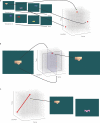Relational memory and the hippocampus: representations and methods - PubMed (original) (raw)
Relational memory and the hippocampus: representations and methods
Alex Konkel et al. Front Neurosci. 2009.
Abstract
Since the discovery of the importance of the hippocampus for normal memory, considerable research has endeavored to characterize the precise role played by the hippocampus. Previously we have offered the relational memory theory, which posits that the hippocampus forms representations of arbitrary or accidentally occurring relations among the constituent elements of experience. In a recent report we emphasized the role of the hippocampus in all manner of relations, supporting this claim with the finding that amnesic patients with hippocampal damage were similarly impaired on probes of memory for spatial, sequential, and associative relations. In this review we place these results in the context of the broader literature, including how different kinds of relational or source information are tested, and consider the importance of specifying hippocampal function in terms of the representations it supports.
Keywords: amnesia; hippocampus; memory representations; relational memory.
Figures
Figure 1
A schematic of the putative hippocampal representation. (A) At encoding (illustrated with stimuli from Konkel et al., 2008), items are encoded into a multi-dimensional representational space according to aspects such as time and location, thereby capturing all the various types of relations among items. (B) When relational or source memory is tested via recognition (e.g., where was this item studied?), the item together with the source probe constrains or limits the space to be searched, aiding retrieval of the relevant information (i.e., activation of the relevant node). (C) Activation of a given node in the space may also lead to reactivation of related nodes (here, retrieving the next item and location in the sequence).
Similar articles
- Hippocampal amnesia impairs all manner of relational memory.
Konkel A, Warren DE, Duff MC, Tranel DN, Cohen NJ. Konkel A, et al. Front Hum Neurosci. 2008 Oct 29;2:15. doi: 10.3389/neuro.09.015.2008. eCollection 2008. Front Hum Neurosci. 2008. PMID: 18989388 Free PMC article. - A comparison and evaluation of the predictions of relational and conjunctive accounts of hippocampal function.
Moses SN, Ryan JD. Moses SN, et al. Hippocampus. 2006;16(1):43-65. doi: 10.1002/hipo.20131. Hippocampus. 2006. PMID: 16270317 - Processing and short-term retention of relational information in amnesia.
Ryan JD, Cohen NJ. Ryan JD, et al. Neuropsychologia. 2004;42(4):497-511. doi: 10.1016/j.neuropsychologia.2003.08.011. Neuropsychologia. 2004. PMID: 14728922 - Hippocampal place cells, context, and episodic memory.
Smith DM, Mizumori SJ. Smith DM, et al. Hippocampus. 2006;16(9):716-29. doi: 10.1002/hipo.20208. Hippocampus. 2006. PMID: 16897724 Review. - Hippocampus and contextual fear conditioning: recent controversies and advances.
Anagnostaras SG, Gale GD, Fanselow MS. Anagnostaras SG, et al. Hippocampus. 2001;11(1):8-17. doi: 10.1002/1098-1063(2001)11:1<8::AID-HIPO1015>3.0.CO;2-7. Hippocampus. 2001. PMID: 11261775 Review.
Cited by
- Medial temporal lobe contributions to cued retrieval of items and contexts.
Hannula DE, Libby LA, Yonelinas AP, Ranganath C. Hannula DE, et al. Neuropsychologia. 2013 Oct;51(12):2322-32. doi: 10.1016/j.neuropsychologia.2013.02.011. Epub 2013 Mar 1. Neuropsychologia. 2013. PMID: 23466350 Free PMC article. - Worth a glance: using eye movements to investigate the cognitive neuroscience of memory.
Hannula DE, Althoff RR, Warren DE, Riggs L, Cohen NJ, Ryan JD. Hannula DE, et al. Front Hum Neurosci. 2010 Oct 8;4:166. doi: 10.3389/fnhum.2010.00166. eCollection 2010. Front Hum Neurosci. 2010. PMID: 21151363 Free PMC article. - Establishment of an attentional set via statistical learning.
Cosman JD, Vecera SP. Cosman JD, et al. J Exp Psychol Hum Percept Perform. 2014 Feb;40(1):1-6. doi: 10.1037/a0034489. Epub 2013 Oct 7. J Exp Psychol Hum Percept Perform. 2014. PMID: 24099589 Free PMC article. - Identifying and characterizing the effects of nutrition on hippocampal memory.
Monti JM, Baym CL, Cohen NJ. Monti JM, et al. Adv Nutr. 2014 May 14;5(3):337S-43S. doi: 10.3945/an.113.005397. Print 2014 May. Adv Nutr. 2014. PMID: 24829486 Free PMC article. Review. - Aerobic fitness, hippocampal viscoelasticity, and relational memory performance.
Schwarb H, Johnson CL, Daugherty AM, Hillman CH, Kramer AF, Cohen NJ, Barbey AK. Schwarb H, et al. Neuroimage. 2017 Jun;153:179-188. doi: 10.1016/j.neuroimage.2017.03.061. Epub 2017 Mar 30. Neuroimage. 2017. PMID: 28366763 Free PMC article.
References
- Cohen N. J. (1984). Preserved learning capacity in amnesia: evidence for multiple memory systems. In Neuropsychology of Memory, Squire L. R., Butters N., eds (New York, Guilford Press; ), pp. 83–103
LinkOut - more resources
Full Text Sources
